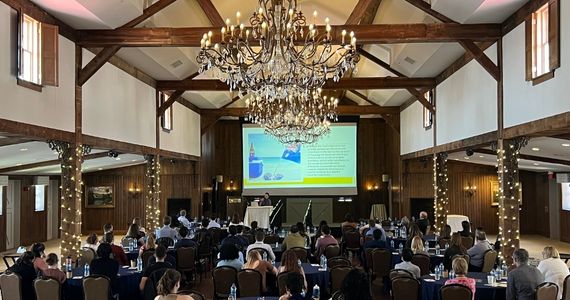T32 Grant Enhances Training Opportunities for Graduate Students and Faculty

First annual T32 spinal cord injury training program retreat April 2022 at Normandy Farms Hotel and Conference Center, Blue Bell, PA
August 22, 2022
Sandra Strang, EdM, director of communications and events in the Graduate College, sat down with Peter Baas, PhD, professor and director of the graduate program in neuroscience, and Michael Lane, PhD, associate professor in the Department of Neurobiology and Anatomy in the Graduate School of Biomedical Sciences and Professional Studies in the College of Medicine to learn more about the National Institutes of Health (NIH) T32 spinal cord injury training program at Drexel, which is entering its second year of five. Baas and Lane are co-directors of the program, the first T32 training program exclusively at Drexel.
T32s are meant to fulfill a specific need in the world of biomedical research and to help train the next generation of scientists. While applying for the grant, Baas and Lane and their colleagues worked closely with NIH representatives to identify a research area at Drexel that was sufficiently mature that it would compete well for a T32. They were confident that the long and successful history of spinal cord research in the Marion Murray Spinal Cord Research Center (MM-SCRC) at Drexel, which has been operational for more than 35 years, and the structures in place to support the program, including several funded laboratories and a strong community of researchers and scholars, would be sufficient to earn the grant. "It was a long road to success," said Baas, "But we persevered."
The Spinal Cord Injury Graduate Training Program (T32) offers a rich and unique training experience in spinal cord injury, research methods and clinical perspectives. The training program provides trainees with the multidisciplinary research skills, an appreciation of the breadth within the field, and the networking and communication skills needed to address shifting challenges in neuroscience and spinal cord injury research and become future leaders. The research being conducted prepares students for research across a broad spectrum of multidisciplinary techniques and strategies, including:
- Neural regeneration and plasticity
- Neuroinflammation
- Neural network and computational neuroscience
- Neural engineering
- Rehabilitation and training
- Stem cell biology and cellular repair
- Gene therapy

"It's really a wonderful opportunity for [the] University…it's a mark of prestige and recognition that a training program has achieved a level of sophistication that it's ready for a T32," said Baas (pictured right).
Lane also offered that "the T32 funding mechanism is to support the strengths that already exist at Drexel and is a peer-reviewed recognition of the fact that we have a very strong training program."
Each year, the grant funds two PhD students for two years, their stipends, healthcare, travel expenses and supplies, and provides additional funds for training-related expenses, such as external speakers, professional development workshops, training in advanced tools and technologies, and an annual off-campus retreat featuring industry experts on a variety of related topics.
Baas noted that "the T32 training experience is not just for the students who are funded, it's for everybody," including the students, postdocs, faculty, and professional staff. He also noted that the program requires a full commitment from all involved.
Jed Shumsky, PhD, professor of neurobiology and anatomy and senior associate dean of education and academic affairs for the Graduate School of Biomedical Sciences and Professional Studies in the College of Medicine, serves as the quantitative literacy advocate for the program, participating in all aspects and ensuring the program’s success.
The program’s first off-campus annual retreat took place in April at Normandy Farm Hotel and Conference Center in Blue Bell, Pennsylvania. Attendees had the opportunity to hear directly from people whose lives are affected by spinal cord injury, their families and healthcare workers. The experience was highly impactful for all as it gave real meaning to the work. View more photos from the retreat.
In year two, participants will work more closely with area institutions who are doing similar work and network with their trainees. The following year will feature training on manuscript and grant writing, bringing in representatives from funding agencies and public journals.

Lane (pictured right) is most excited about giving students exposure to a wide variety of experiences, as well as getting feedback from students to continue to enhance the program. Baas hopes the program will allow junior faculty to take on more responsibility and develop into the leaders of the future.
"We have a great training environment here. We pay a great deal of attention to our graduate students and postdocs and I hope that this could spark many more T32s," said Baas.
Baas and Lane hope that the program will attract more competitive and diverse students and faculty to Drexel and help Drexel fortify its role as a leader in spinal cord injury research. The program has already gained exposure in the Philadelphia region through the ongoing series of workshops offered in collaboration with other institutions and industry partners.
Their advice to their Drexel colleagues? Put in the time and effort. It’s worth it.
Watch the full interview on Drexel Streams.